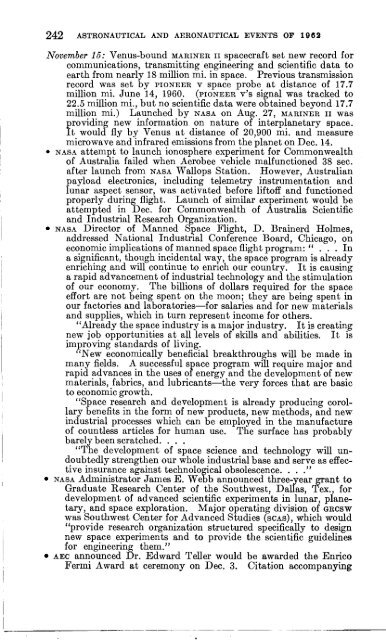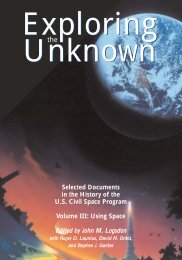Astronautical and Aeronautical Events of 1962 - NASA's History Office
Astronautical and Aeronautical Events of 1962 - NASA's History Office
Astronautical and Aeronautical Events of 1962 - NASA's History Office
Create successful ePaper yourself
Turn your PDF publications into a flip-book with our unique Google optimized e-Paper software.
242 ASTRONAUTICAL AND AERONAUTICAL EVENTS OF <strong>1962</strong><br />
November 15: Venus-bound MARINER 11 spacecraft set new record for<br />
communications, transmitting engineering <strong>and</strong> scientific data to<br />
earth from nearly 18 million mi. in space. Previous transmission<br />
record was set by PIONEER v space probe at distance <strong>of</strong> 17.7<br />
million mi. June 14, 1960. (PIONEER v’s signal was tracked to<br />
22.5 million mi., but no scientific data were obtained beyond 17.7<br />
million mi.) Launched by NASA on Au . 27, MARINER 11 was<br />
providing new information on nature <strong>of</strong> interplanetary space.<br />
It would fly by Venus at distance <strong>of</strong> 20,900 mi. <strong>and</strong> measure<br />
microwave <strong>and</strong> infrared emissions from the planet on Dec. 14.<br />
0 NASA attempt to launch ionosphere experiment for Commonwealth<br />
<strong>of</strong> Australia failed when Aerobee vehicle malfunctioned 38 sec.<br />
after launch from NASA Wallops Station. However, Australian<br />
payload electronics, including telemetry instrumentation <strong>and</strong><br />
lunar aspect sensor, was activated before lift<strong>of</strong>f <strong>and</strong> functioned<br />
properly durin Launch <strong>of</strong> similar experiment would be<br />
.<br />
attempted in %Iflight ec. for Commonwealth <strong>of</strong> Australia Scientific<br />
<strong>and</strong> Industrial Research Organization.<br />
NASA Director <strong>of</strong> Manned Space Flight, D. Brainerd Holmes,<br />
addressed National Industrial Conference Board, Chicago, on<br />
economic implications <strong>of</strong> manned space flight program: ‘‘ . . . In<br />
a significant, though incidental way, the space program is already<br />
enriching <strong>and</strong> will continue to enrich our country, It is causing<br />
a rapid advancement <strong>of</strong> industrial technology <strong>and</strong> the stimulation<br />
<strong>of</strong> our economy. The billions <strong>of</strong> dollars required for the space<br />
effort are not being spent on the moon; they are being spent in<br />
our factories <strong>and</strong> laboratories-for salaries <strong>and</strong> for new materials<br />
<strong>and</strong> supplies, which in turn represent income for others.<br />
“Already the space industry is a major industry. It is creating<br />
new job opportunities at all levels <strong>of</strong> skills <strong>and</strong> abilities. It is<br />
improving st<strong>and</strong>ards <strong>of</strong> living.<br />
‘[New economically beneficial breakthroughs will be made in<br />
many fields. A successful space program will require major <strong>and</strong><br />
rapid advances in the uses <strong>of</strong> energy <strong>and</strong> the development <strong>of</strong> new<br />
materials, fabrics, <strong>and</strong> lubricants-the very forces that are basic<br />
to economic growth.<br />
“Space research <strong>and</strong> development is already producing corollary<br />
benefits in the form <strong>of</strong> new products, new methods, <strong>and</strong> new<br />
industrial processes which can be employed in the manufacture<br />
<strong>of</strong> countless articles for human use. The surface has probably<br />
barelybeenscratched. . . .<br />
“The development <strong>of</strong> space science <strong>and</strong> technology will undoubtedly<br />
strengthen our whole industrial base <strong>and</strong> serve as effec-<br />
tive insurance against technological obsolescence. . . . 11<br />
NASA Administrator James E. Webb announced three- ear grant to<br />
Graduate Research Center <strong>of</strong> the Southwest, Dalcs, Tex., for<br />
development <strong>of</strong> advanced scientific experiments in lunar, plane-<br />
tary, <strong>and</strong> space exploration. Major operating division <strong>of</strong> GRCSW<br />
was Southwest Center for Advanced Studies (SCAS), which would<br />
“provide research organization structured specifically to design<br />
new space experiments <strong>and</strong> to provide the scientific guidelines<br />
for engineering them.”<br />
AEC announced Dr. Edward Teller would be awarded the Enrico<br />
Fermi Award at ceremony on Dec. 3. Citation accompanying
















